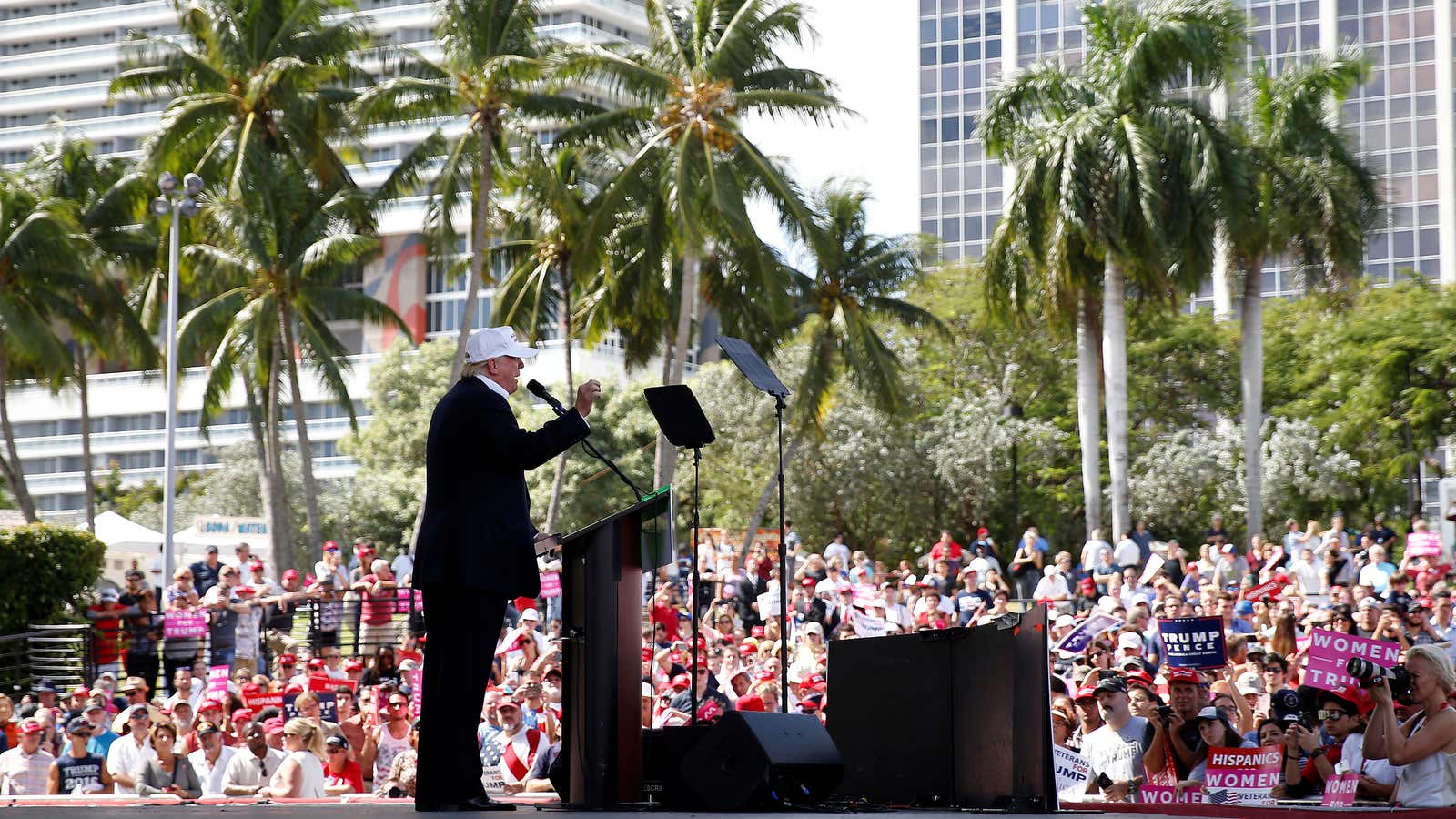Donald Trump is setting out to Miami in an airplane, but it might as well be a time machine. In a speech tomorrow (June 16), the US president will announce rollbacks of the normalization with Cuba that Barack Obama began, setting US relations with the island back to the decades of the Cold War.
And now, as then, the get-tough policy with Cuba will simply be a gift to Moscow, wrapped in hardline rhetoric from an influential minority.
The Miami Herald and Politico are confirming what Quartz reported last week: Trump’s decision to restrict travel and limit trade with Cuba is not being driven by foreign-policy concerns, business interests, or human rights. Instead, two conservative Cuban-American lawmakers, Mario Diaz-Balart and Marco Rubio, have been the force behind the change, urging a small group of Trump insiders to reverse the policy put in place by Barack Obama without input from other lawmakers and in the face of objections from all the other government agencies involved in Cuba policy.
The rollbacks are expected to make tourist travel to Cuba more difficult and forbid US citizens or permanent residents from doing business with state-controlled Cuban firms. These include hotels, tour operators, and restaurants, as well as producers of luxury export goods like cigars and rum. Such a move would increase the legal risks for any American travelling to Cuba, but it remains to be seen how much the final rules will effect travelers.
However, the White House doesn’t intend to close the US embassy or end diplomatic relations with Cuba, which is just beginning the slow transition away from its revolutionary founders after Fidel Castro’s death last year. Also thought to be unaffected will be the Obama administration’s decision to let Cuban-Americans send unlimited remittances to relatives on the island.
The move is being painted as a way to push back against Russia. White House sources told Politico’s Mark Caputo that the officials behind the policy were “concerned that electronic copies of policy memos could fall into the hands of foreign agents, including Russia, which has a longstanding friendship with the Castro government.”
But most foreign-policy observers think Russia has more to gain if the US restricts ties with Cuba than if it expands them. Without cash from US tourists and companies, the island will be increasingly dependent on Russia as an economic patron, especially as Venezuela, another stalwart Cuban ally, falls apart.
“If we pull out and return to a policy of isolation, then we leave the field open, not just for the Russians but for the Chinese, who are also really interested in building influence in Cuba,” William Leogrande, an American University expert on Latin America, told me last week.
In recent years, Russia has forgiven billions of dollars of Cuban debt and become a major supplier of petroleum once again. Military cooperation between the two countries, including a Russian base 90 miles from the US mainland, could be next on the agenda.
“A close military alliance between Russia and Cuba could have grave security consequences for the United States,” US senator Patrick Leahy warned in an op-ed yesterday. “One obvious way to mitigate Russian influence in our hemisphere is through enhanced engagement with Cuba.”
Human-rights groups, too, aren’t happy that their cause is being invoked as a reason for the rollback. Though they recognize the abuses by the Cuban government, they say that closer US-Cuba relations have improved the situation, and that ending the opening-up won’t have obvious benefits.
“I’m in Havana now, and one thing is clear: The Cuban people want engagement to continue,” said Emily Mendrala, an Obama administration official who worked on the Cuba normalization and now leads an organization that promotes engagement with the island nation. “I heard as much from my AirBnB hostess, her property manager, and my taxi driver from a private taxi service. I continue to urge the administration to heed the calls from Cubans and Americans alike to prioritize engagement.”
